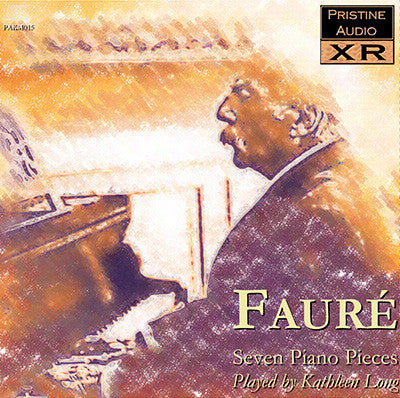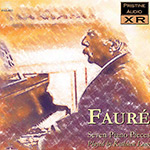
This album is included in the following sets:
This set contains the following albums:
- Producer's Note
- Full Track Listing
- Cover Art
- Historic Review
Kathleen Long plays Fauré
XR remastered for Pristine Classical
The March 2006 issue of The Gramophone magazine printed a letter from
Phillip Arnold of Staffordshire, England, requesting Kathleen Long's
Fauré Ballade recording, which also included the highlighted lines:
May
I make an impassioned plea through the pages of your magazine, which I
have now been buying since 1964, for the release on CD of what I (as I
am sure do many others) consider to be one of the great recordings of
the 20th century? Dutton Laboratories has already released Kathleen
Long's 1944 recording of Fauré's Ballade (with the NSO conducted by Boyd
Neel) together with two Mozart concertos and Walter Leigh's Concertino.
However, she re-recorded the Ballade (conducted by Jean Martinon) as well as recording the Theme and Variations and some Barcarolles, Impromptus and Nocturnes in the early 1950s for Decca's long-playing LXT label...
In
March 2006 we were happy to be able to respond to Mr. Arnold's primary
wish, a remastered reissue of the Ballade, and now we are delighted to
complete this part of our exploration of the piano recordings of
Kathleen Long with further recordings of Fauré, released here in the
same order as on the original Decca ten-inch LPs. This was in some ways a
tougher prospect for the restorer - sound quality on the discs (and we
used a number of copies) was not great. The LM series was secondary to
the more prestigious LXT label, and it is possible that quality checks
were not quite as rigorous here. However, I have endeavoured to elicit
the same sound quality from these recordings as with the later Ballade
and Nocturnes, to which Mr. Arnold responded thus:
I have
now played the CD of the Kathleen Long Ballade and Nocturnes - it's as
fresh as I remember when I bought it as a schoolboy! Wonderful! Many
thanks for achieving this... Much appreciated - Phillip Arnold
I returned to the recording a year later with the application of
Prstine Audio Natural Sound, a remastering technique which has provided
further advances in the sound quality of these wonderful recordings.
The
return to this was in part prompted by my obtaining a set of Gramphone
magazines for 1944, and finding this review in the February issue of
that year:
Andrew Rose
- FAURÉ Impromptu No. 2 in F minor, Op. 31 - rec 1950?[a]*
- FAURÉ Nocturne No. 6 in D flat major, Op. 63 - rec 16/10/44
- FAURÉ Barcarolle No 2 in G major, Op. 41 - rec 16/10/44
- FAURÉ Nocturne No. 13 in B minor, Op. 119 - rec 8/12/48
- FAURÉ Barcarolle No. 1 in A minor, Op. 26 - rec 1950?*
- FAURÉ Nocturne No. 4 in E flat major, Op. 36 - rec 8/12/48
- FAURÉ Theme and Variations in C sharp minor, Op. 73 - rec. 20/9 & 29/11/43
*These pieces were made to provide LP couplings for recordings dating from 1943-48 and were not allocated 78rpm matrix numbers. In consequence it has not been possible to date them precisely, though they were probably recorded in a single session, with the tapes perhaps being edited on [a] 3 Jly 50.
Originally released as Decca 78s
Transcribed from 1950/1 Decca 10" LPs LM4523, 4528
Matrix numbers: DRL.436-7A, DRL.435-1A, DRL462-1A, DRL461-1B
Duration 46:22
Kathleen Long, piano
ORIGINAL LP ISSUE:
Kathleen Long (piano): Theme and Variations, Op. 73 (Fauré).
Decca M547-8 (10 in., 10S. 9d.)
Cortot wrote of this work: " (Its) wealth of material, depth of emotion, and the quality of its musical texture make it, without doubt, one of the finest and most precious things in the literature of the piano for all time."
The more one knows of the work, the more true Cortot's verdict appears to be. The theme itself has a grave and noble beauty which links it, in my mind, with Couperin's wonderful Passecaille, and in each variation Fauré draws something rare and new from its" lyrical essence." In the first Variation the bass has the theme and the treble is given very delicate passagework. A portion of the theme comes into the bass of the second variation like a recurring refrain, while the treble has it in altered rhythmic form. The charm of the third variation lies in the constant alternation of two and three note groups. From this point the variations grow in subtlety of harmonic expression while keeping always their clarity of texture. No. 9, a little nocturne, is perhaps the climax of sheer beauty of ordered sound. No. 10, the most rapid and brilliant, is followed by a last variation which makes a quiet and noble epilogue. Technically speaking it presents simultaneously the theme in the bass and its inversion in the treble, both rhythmically altered from the original form.
The music is admirably suited to Miss Long's reserved style, and, as always, she plays it with great clarity. The very high treble notes do not record very well but otherwise there is little to criticise, except a noisy surface on the first side (of my copy) of the second record. It would be grand if this artist would now give us a selection of the Impromptus, Nocturnes and Barcarolles - which no one ever seems to play.
A.R., The Gramophone

